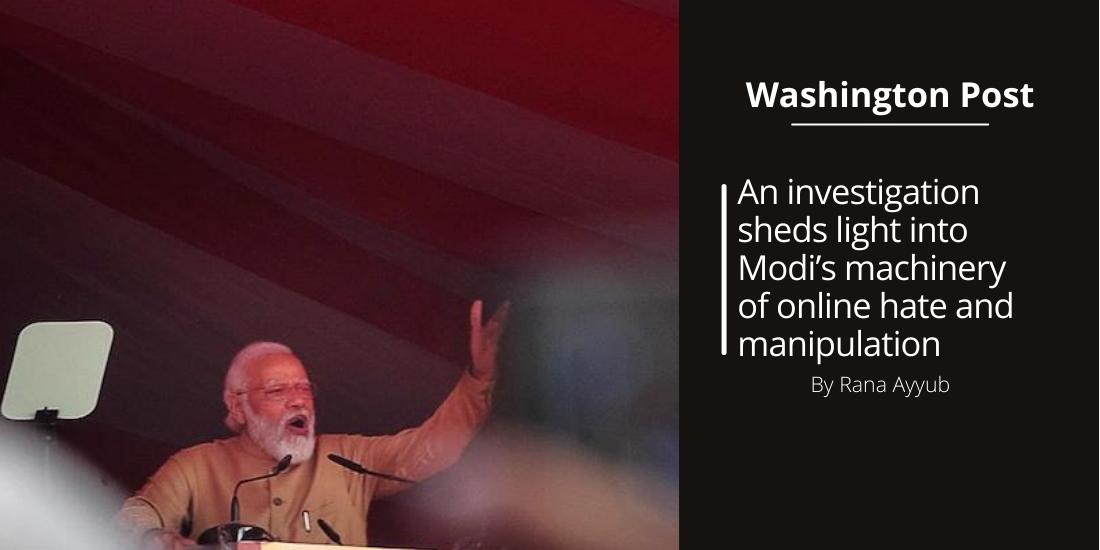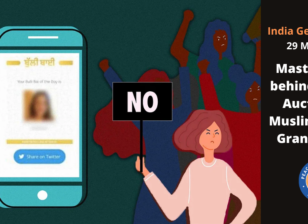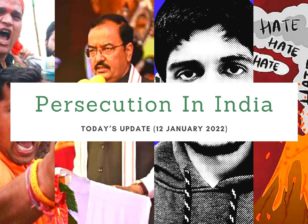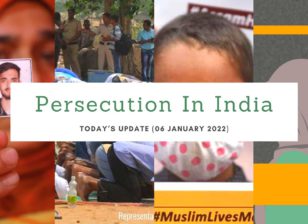Wash Post: An investigation sheds light into Modi’s machinery of online hate and manipulation
On Jan. 6, the Wire, an independent Indian news site, began publishing an in-depth investigative series that accused Prime Minister Narendra Modi’s governing party, the BJP, of deploying a sophisticated app to hijack social media and even encrypted messaging platforms in order to manipulate public opinion and launch online campaigns against those it believed were a threat to the government, including female journalists.
The Wire investigated this dark underbelly of the Modi government with the help of a whistleblower, a former worker in the BJP’s information technology cell infamous for the spread of malicious fake news in the country. Many activists, politicians and journalists, including myself, have spoken out before about the brazen hatred and vitriol unleashed against them since Modi rose to power in 2014. The prime minister himself follows some of the country’s most misogynistic and abusive social media accounts.
Unlike other political parties in India, the BJP understood early the importance of dominating the digital landscape. Modi’s core campaign team included not just political operatives but also media managers, PR strategists, lobbyists and heads of various IT firms. Together they crafted a vindictive social media strategy used to not just bolster Modi’s image, but also discredit the image of his opposition. In 2013, I published an investigation into the strategy, “Modi’s Operandi,” where I systematically put together all the pieces that made up his online hate factory.
The rigorous investigation by the Wire confirmed and validated what many of us have known and experienced for years. But it goes beyond that: It reiterates the danger Modi presents to the Indian democracy.
The Tek Fog investigation unveiled how the app is used to target female journalists in India with sexist attacks and threats. According to the investigation, I top the list of journalists in India who have received the most abuses generated through the app.
Between January 2021 and May 2021, this app was used to send a staggering 22,000 abusive tweets to me. Another Post Global Opinions columnist, Barkha Dutt, and journalists such as Nidhi Razdan and Sagarika Ghose were among the other women targeted.
The Wire investigation came on the heels of another traumatic experience. More than 100 Muslim women, including a prominent actress, multiple journalists, activists and politicians, were displayed on an app for “auction” as “Bulli Bai” of the day. “Bulli” is a derogatory word used for Muslim women.
The app was taken down, and the Mumbai police arrested three people — all young sympathizers of the right-wing ecosystem in India. In a strong statement, the Editors Guild of India condemned “the continued online harassment of women journalists, which includes targeted and organized online trolling as well as threats of sexual abuse. What is further disturbing is that most of these attacks are targeted at journalists, who have been outspokenly critical of the current government and the ruling party, to silence them. This is a travesty of all democratic norms, and in violation of law.”
Unsurprisingly, neither Modi nor a single female minister in his cabinet has reached out publicly in defense or support of the victims. It’s clear these sophisticated digital campaigns of harassment and intimidation serve a broader strategy.
It’s up to the victims to accommodate and learn how to live with this. It must be our fault.
In 2018, BJP members shared screenshots of a manipulated pornographic video that showed my face. A year later, a right-wing website unleashed a character assassination campaign against me based on a fake news story and inundated my Twitter and Facebook timeline with the most humiliating insinuations about my character and messages soliciting sexual favors.
I would be lying if I said it hasn’t affected me, that I’ve been able to simply brave on. In fact, the threats, the harassment, have made me want to give up journalism. I’ve felt humiliated; I was made a free-for-all for a virtual lynch mob that sexualized my existence. It was hard to get out of bed. What would people think of me? Though I knew my truth, I also knew I was a part of a patriarchal society that placed great premium on a woman’s character, and the only way to discredit a female journalist was to unleash an assault on her character. The support of my family and the journalism community made me realize that I was being targeted because my work made a difference. The harassment continues to this day. My Instagram and Facebook are always inundated with the most vicious rape threats.
In 2017, journalist Gauri Lankesh was assassinated outside her house by right-wing radicals. Lankesh was one of the most abused and targeted journalists on social media. But the threats did not stay confined to the digital space. The hate that killed her could soon come calling at our doorstep, too.




